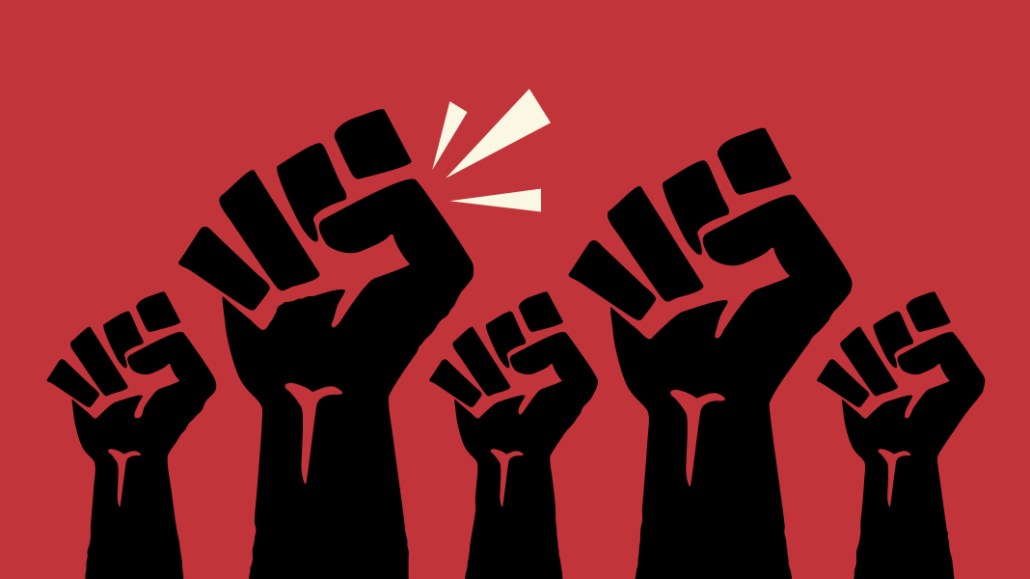Secure your place at the Digiday Media Buying Summit in Nashville, March 2-4
‘Tired of hearing we don’t exist’: How ad execs are debunking the myth that so few Black and non-Black people work in advertising

This Future of Marketing Briefing covers the latest in marketing for Digiday+ members and is distributed over email every Friday at 10 a.m. ET. More from the series →
A few years ago, during Advertising Week 2015, a photo of seven non-Black ad execs sitting in front of a banner that read, “Here are all the Black people,” went viral. It made sense at the time as the photo seemed to capture the baffling way that the industry had been addressing the lack of diversity within ad agencies — a public show of support by mostly white ad execs saying they would address it — with little and waning follow up.
Of course, the context of the photo wasn’t what it seemed as the execs were on a cause marketing panel at an event called “Here are all the Black people.” Even so, there’s a reason it garnered so much attention. Frustration at the lack of diversity within ad agencies and the lackluster responses of ad execs to do something about it is nothing new.
Black and non-Black people of color have been calling on agencies to address the issue in a meaningful way for years only to hear from ad execs and HR directors that they are working on it, but can’t find people to hire. This past summer, with the renewed focus on diversity and inclusion at agencies following the killing of George Floyd and subsequent protests for equality and social justice, there’s been a push from Black execs in this industry to debunk that myth.
“Fast forward to this pandemic and individuals like Ahmaud [Arbery] being murdered and what this has done to the industry as a whole, I think we’ve come to a boiling point,” said Walter Geer III, executive creative director of experience design at VMLY&R. “People of color are tired of hearing that we ‘don’t exist’ or ‘we’re not here’ or ‘they can’t find the talent.’”
Spurred on by that well-worn excuse as well as the desire to network with other creatives who “looked like us,” Geer and Ron Lewis, vp and creative director at McCann Health, launched Diverse Creatives, a database of sorts that now has roughly 2500 of Black and non-Black people of color in advertising for agencies to potentially hire, this past July.
Geer and Lewis aren’t alone. Just last week, Keni Thacker, founder of 100 Roses from Concrete, a networking group for men of color in advertising, sent out an ebook to hiring managers and recruiters filled with resumes of mostly Black and non-Black people of color to point those hiring managers and recruiters to Black and brown talent.
“We hear it all the time,” said Thacker. “I’ve heard it to my face, ‘Oh, we just can’t find Black and brown talent, Black and brown women of color talent.’ Or when they do find them they don’t have the right skills. I created this to debunk that myth.”
Giving hiring managers and ad execs new resources is a start, according to agency execs and industry observers. Per Lewis, Diverse Creatives has already helped some diverse creative candidates land job interviews or paid freelance gigs as well as become a “best practice” playbook for some agency execs to use when hiring.
Aside from looking at lists, agency hiring directors and recruiters should be following Black and non-Black people of color on social media, according to ad recruiter Christie Cordes. “Connect with them, follow them, and include them into the agency’s social circle of who they follow.”
Still showing that there are plenty of talented Black and non-Black people of color to hire is just the beginning. To truly address the diversity problem within agencies, executives say that agencies need to give mentorship and foster Black and non-Black people of color talent, helping them move up the ranks at agencies and stay in the industry.
“We haven’t addressed the thinking on the inside,” said Derek Walker, founder of Brown and Browner. “If you haven’t done that then nobody is changing because they still don’t understand. If I don’t change your mind no matter how many people you hire you still won’t see them as equal.”
To address the lack of diversity in agencies is a multi-pronged issue. “There’s getting them in the door, which is finding them,” said Lewis. “There’s hiring enough of them that you’re building a community internally because guess what, if you’re just hiring one person of color and dropping them into a culture that was not built for them they’re going to leave.”
Lewis continued: “You need to have mentorship in place, meaning having diverse leadership to keep them up. Pay them equally. Promote them on merit equally. Then you’ll see more of a steady stream so that you know where to look, you know how to support them once they are in there and you know how to get them up to the upper ranks — It’s going to then keep feeding itself naturally.”
More in Marketing

Future of Marketing Briefing: AI’s branding problem is why marketers keep it off the label
The reputational downside is clearer than the branding upside, which makes discretion the safer strategy.

While holdcos build ‘death stars of content,’ indie creative agencies take alternative routes
Indie agencies and the holding company sector were once bound together. The Super Bowl and WPP’s latest remodeling plans show they’re heading in different directions.

How Boll & Branch leverages AI for operational and creative tasks
Boll & Branch first and foremost uses AI to manage workflows across teams.








